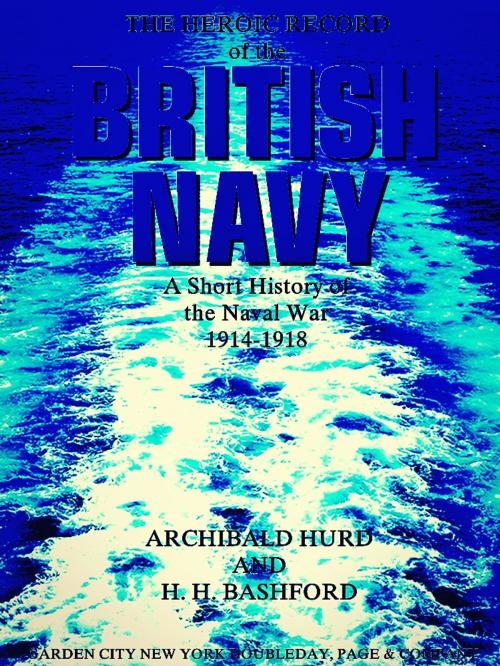The Heroic Record of the British Navy
A Short History of the Naval War, 1914-1918
Nonfiction, History, Military, Naval, World War I, British| Author: | Henry Howarth Bashford, Archibald Hurd | ISBN: | 1230000280414 |
| Publisher: | DOUBLEDAY, PAGE & COMPANY | Publication: | November 16, 2014 |
| Imprint: | Language: | English |
| Author: | Henry Howarth Bashford, Archibald Hurd |
| ISBN: | 1230000280414 |
| Publisher: | DOUBLEDAY, PAGE & COMPANY |
| Publication: | November 16, 2014 |
| Imprint: | |
| Language: | English |
Example in this ebook
In the years immediately preceding the Great War, already so hard to reconstruct, it was not uncommonly suggested that the British seafaring instinct had begun to decline. In our professional navy most thinkers had confidence, as in a splendid machine ably manned; but, as regarded the population as a whole, it was feared that modern industrialism was sapping the old sea-love. That this has been disproved we hope to make clear in the following pages—a first attempt, as we believe, to give, in narrative form, a reasonably complete and consecutive history of the naval war. We have indeed gone further, for we have tried to show not only that the spirit of admiralty has survived undiminished, but that we have witnessed such a re-awakening of it, both in Great Britain and America, as has had no parallel since the days of Elizabeth. We have also tried to make clear that, in a thousand embodiments, in men and boys fallen or still living, it has shone with a spiritual even more than any material significance; and that it has again declared itself to be the peculiar expression in world-affairs of the English-speaking races.
Nor was the little apparent interest shown, just before the war, in the navy and the navy's exercises very remarkable. Our attitude, as a people, toward it had always been a curious union of apathy and adventure. We had been sea-worshippers so long that our reverence had often been dulled by much familiarity, and to such an extent, at times, that, only by the supremest efforts, had we, as a nation, escaped catastrophe. But if, on the one hand, we had lost the neophyte's fire, we had perhaps gained a little in tolerance. The seas had not found in us jealous masters. Our harbours and ships had been at the world's disposal. No empire in history had been so leisurely or less designedly built up, as none was to prove, perhaps, to have been so apparently loosely but yet so organically knit—probably because the idea of empire had always meant less to us than the growing idea of admiralty. Nor is that so obscure as it may at first seem, since, in spite of so much outward indifference, the call of the sea, as closer examination will show, was still among the most insistent to which we responded. There was scarcely a cottage, for instance, even in the remotest highlands, in which the picture of a ship did not hang upon the walls, or that had failed to send a son or a brother or a cousin to serve either in the navy or the mercantile marine. Even in the greyest and most smoke-laden of our central industrial cities, wherever there was a pond, the children sailed their little boats upon it; and, once a year, as to some lustral rite, the town-bred inhabitant took his family to the coast.
To be continue in this ebook...............................................................................................................
Example in this ebook
In the years immediately preceding the Great War, already so hard to reconstruct, it was not uncommonly suggested that the British seafaring instinct had begun to decline. In our professional navy most thinkers had confidence, as in a splendid machine ably manned; but, as regarded the population as a whole, it was feared that modern industrialism was sapping the old sea-love. That this has been disproved we hope to make clear in the following pages—a first attempt, as we believe, to give, in narrative form, a reasonably complete and consecutive history of the naval war. We have indeed gone further, for we have tried to show not only that the spirit of admiralty has survived undiminished, but that we have witnessed such a re-awakening of it, both in Great Britain and America, as has had no parallel since the days of Elizabeth. We have also tried to make clear that, in a thousand embodiments, in men and boys fallen or still living, it has shone with a spiritual even more than any material significance; and that it has again declared itself to be the peculiar expression in world-affairs of the English-speaking races.
Nor was the little apparent interest shown, just before the war, in the navy and the navy's exercises very remarkable. Our attitude, as a people, toward it had always been a curious union of apathy and adventure. We had been sea-worshippers so long that our reverence had often been dulled by much familiarity, and to such an extent, at times, that, only by the supremest efforts, had we, as a nation, escaped catastrophe. But if, on the one hand, we had lost the neophyte's fire, we had perhaps gained a little in tolerance. The seas had not found in us jealous masters. Our harbours and ships had been at the world's disposal. No empire in history had been so leisurely or less designedly built up, as none was to prove, perhaps, to have been so apparently loosely but yet so organically knit—probably because the idea of empire had always meant less to us than the growing idea of admiralty. Nor is that so obscure as it may at first seem, since, in spite of so much outward indifference, the call of the sea, as closer examination will show, was still among the most insistent to which we responded. There was scarcely a cottage, for instance, even in the remotest highlands, in which the picture of a ship did not hang upon the walls, or that had failed to send a son or a brother or a cousin to serve either in the navy or the mercantile marine. Even in the greyest and most smoke-laden of our central industrial cities, wherever there was a pond, the children sailed their little boats upon it; and, once a year, as to some lustral rite, the town-bred inhabitant took his family to the coast.
To be continue in this ebook...............................................................................................................















